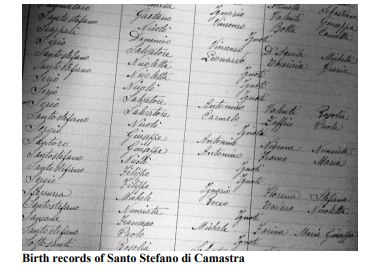FINDING STEFANO
In September, my cousin, aunt and I took our dream trip to find our family’s roots in Santo Stefano di Camastra. Santo Stefano is a small town about ninety minutes west of Palermo that is famous for its ceramics. It is built high on a cliff overlooking the Tyrrhenian Sea. We booked a room at the lovely I Colori Dell’Arcobaleno (colors of the rainbow) and asked our host for help.
He sent us to the town hall, which is where the records are kept. We were very nervous because the last primary name we were looking for is Stefano, which is the name of the town and 10 everyone told us that it wasn’t a “real” last name. We called the trip “Finding Stefano”. The women at the Town Hall were incredibly helpful. All of the records are handwritten in huge books. We learned that my grandfather’s last name had actually been Santostefano, not Stefano. When we found my grandfather’s birth certificate, they sent us to the local church, which had his baptism record. Unfortunately, there was a big festival that weekend that they were planning so the priest only had time to find this document.
Then, we went back to the town hall to find out about my great grandfather. We knew he worked in the olive groves and that he died at a young age, but we did not know much more. We found his birth and death certificates and were able to learn the name of the street he lived on. They only record street names and not house numbers in the town. We then went to the cemetery to find his grave, but were very disappointed. In the 1950’s, the town decided that the cemetery was too small and moved everyone who was buried into an underground mausoleum but they did not have any markers to identify people. The man in charge of the cemetery told us that what had happened in Santo Stefano was not unique in Sicily.
Finally, we searched for my great great grandfather and the secret to our name was revealed. From approximately 1820 until the early 1900’s, a large number of babies were abandoned at La Chiesa della Madre, one of the churches in town. The nuns took care of the children and tried to find parents for them. When a child was left at the church, it was recorded in the birth records as parents being “Ignoti” (unknown) and given the town’s name as his or her surname. The woman in charge of the records showed me the pages of births during this time period. Almost one in three children had unknown parents and named after the town.
We now know the history of our family and hope to return for more details. I’ve read a lot about the tragic history of Sicily but this was an up-close and personal look into the difficulties they have had through history


